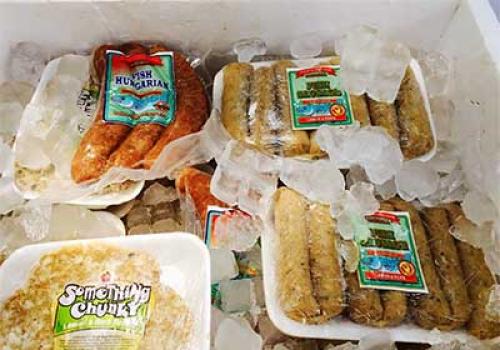SADC Secretariat, working in partnership with the WorldFish Regional Office for Southern Africa based in Zambia, participated in a project titled “Improving Food Security and Reducing Poverty through intra-regional Fish Trade”, otherwise commonly known as Fish-Trade project. The first phase of the project involved corridor analysis to determine information on the structure, products and value of intra-regional fish trade in Malawi, Mozambique, South Africa, Tanzania, Zambia and Zimbabwe. The project identified a lot of challenges hampering intra-regional fish trade, one of them is lack of an enabling environment for fish processors and traders to sell fish across borders, especially to access formal markets within the region.
Article 16 of the SADC Protocol on Fisheries (2001) proposes (i) promotion of trade and investments in fisheries by reducing barriers to trade and investment, (ii) cooperation in establishing regional capacity to implement internationally acceptable standards on quality control and certification of quality, and (iii) establishing of common positions with regard to sustainable trade, eco-labelling of fish products and other fish trade issues of relevance to State Parties. This is in line with the SADC Protocol on Trade which was established in 1996. The SADC Protocol on Trade aims to provide for the elimination of tariffs and non-tariff barriers to trade. The SADC Protocol on Trade through the Technical Barriers to Trade (TBT) Annex (No. 8) establishes a common technical regulation framework, whose objective is the identification, prevention and elimination of unnecessary technical barriers to trade amongst Member States. These framework is supported by TBT Cooperation Structures covering Standardisation, Technical Regulations, Measurement, Traceability, Legal Metrology, Conformity Assessment and Accreditation. The TBT Annex places an obligation on Member States to pursue harmonization of standards and this is done through the SADC Cooperation in Standardisation (SADCSTAN), the TBT Cooperation Structure responsible for standardisation.
In our quest to promote intra-regional fish trade, SADC Secretariat, WorldFish and SADC Member States, working with the SADCSTAN, developed eleven harmonized fish standards for the SADC region as phase two of the Fish-Trade project. This activity was requested by Member States at the 35th meeting of the SADC Technical Committee on Fisheries held in Gaborone, Botswana during June 2016, and is in line with both the SADC Protocols on Fisheries and on Trade. These standards and specifications which can be accessed through National Standards Bodies in SADC Member States include:
i) Standard for canned sardines and sardine-type products;
ii) Specification for dried freshwater small pelagics;
iii) Standard for farmed tilapia (bream);
iv) Specification for fresh and frozen whole finfish;
v) Standard for fresh and chilled fish;
vi) Standard for quick frozen fish fillets;
vii) Standard for smoked finfish, smoke-flavoured finfish and smoke-dried finfish;
viii) Standard for salted fish and dried salted fish;
ix) Standard for fish sausages;
x) Specification for fish snacks (crackers from marine and freshwater fish, crustaceans and molluscan shellfish); and
xi) Good aquaculture practices for bream (tilapia) farming/culture.
These standards are helping to increase capacities for trade amongst private sector associations, in particular of women fish processors and traders and aquaculture producers, to make better use of expanding trade opportunities through competitive small and medium-scale enterprises. In Zambia, the project supported development of fish value chains for the Kafue Women’s Fish Processors Association (KWFPA), and one of the leading small woman-led enterprise, Lotuno Enterprises Ltd.
Members of the association are helped with the storage of fish to prolong the life and educate themselves with strategies to overcome challenges within the fish trade business and hygienic ways of handling fish. The association also promotes an entrepreneurial culture amongst women. The group has been acknowledged through their chairperson who received awards such as Zambian Women of the Year in Aquaculture Award 2016, the SmartFish Award in 2016 for Best Innovative Fish Products and the Zambia Association of Manufacturers Young Woman of the Year Award 2017.
This group has been processing and selling products in the local markets. The standards, especially for fish sausages and fish snacks, have helped the group to improve their processing, and are already negotiating markets outside Zambia.
Through support from another SADC partner project, IOC-SmartFish project, Kafue Women’s Fish Processors Association (KWFPA) and Lotuno Enterprises Ltd participated in the Agricultural Trade event in Lusaka, Zambia, during August 2016, and Agritech in Chisamba, Zambia, during April 2017. This will help them access other regional markets.

